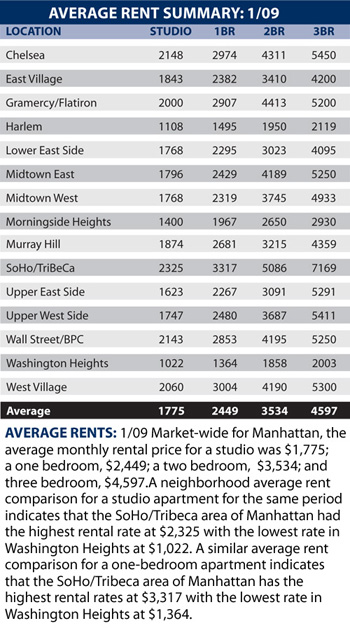If You Think You Might Want to Move But Aren't Sure, Go To Open Houses And See What's On The Market. Brokers hold open houses every day for rental properties, and anyone is free to check them out. This is a good way to gage the market without wasting someone's time. Brokers are very busy people and taking up their time because you want to look at pretty apartments is in poor taste.
Start Looking Three Weeks to a Month Before You Have To Move. Manhattan's rental market moves fast and landlords will only entertain applications for people who are looking to move sooner, rather than later. No one is going to hold an empty apartment for you for a month or two. With a good broker you can easily find the right place in an afternoon, and usually after seeing only a handful of places, assuming they fit your specs for size, price and location.
The Listed Price Has Already Been Adjusted For The Market. I've seen strange amount of people come to my open house for a $2950 one bedroom and ask if they could have it for $2500. Um, no. Renting an apartment is not like buying a car -- there's no shame in paying the sticker price. The listed price reflects current market conditions. True, you can always apply and ask for $100 less, and you might get it. But a $3000 apartment is priced that way for a reason.
Different Neighborhoods Get You More or Less For Your Money. This seems really obvious, but in Manhattan if you want a killer place for little money, go to the Upper East Side. Chelsea, The Village, SoHo/Tribeca and parts of Gramercy are going to be more. See chart below for January 2009 average rents.
Be Logical About What's a Dealbreaker And What's Not. If you're a young professional who works and plays hard, goes away most weekends to ski, etc., do you really need a dishwasher? Also, wouldn't a live-in super play the same role as a doorman, in most cases. Flexibility is key in this market.
Walking into a search with a sense of entitlement because you keep reading that it's a "renter's market" is a quick way to get frustrated. Brokers will do their best to show you exactly what you want, but listen when they offer advice. If they know of a perfect loft that's $200 more than your stated budget, and you can afford it, check it out. A perfect place in Midtown East as opposed to Murray Hill? They might be on to something. Entertain the idea of paying a fee, even a discounted one, even if you started looking at no fee units. You may find exactly what you're looking for.
If You're Seriously Thinking of Buying: Talk to a mortgage broker before you start looking at places. You have to know how much you pre-qualify for before you even go to one open house. You may think you can afford an $800,000 apartment, but lending is tighter than you may realize so know before you go. Brokers will ask you anyway, and it shows that you're serious if you know where you stand.
